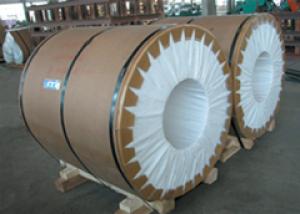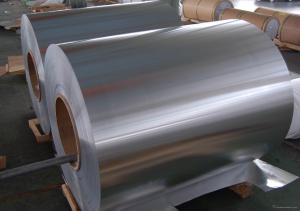Goods Aluminum coil with smooth surface
- Loading Port:
- China Main Port
- Payment Terms:
- TT OR LC
- Min Order Qty:
- -
- Supply Capability:
- -
OKorder Service Pledge
Quality Product, Order Online Tracking, Timely Delivery
OKorder Financial Service
Credit Rating, Credit Services, Credit Purchasing
You Might Also Like
Alloy: AA 5052
Temper:H14/16/18/22/24/32,HO etc.
Thickness:0.2mm—100mm
Width:100mm—2300mm (Can be slitted)
InnerDiameter: 508MM
CoilWeight:500kg-3000kg(Max.)
Application: Foil stock, Circles, Roofing, Canstock, Marine plate,Anti-sliperypurpose in vehicles, packing and appliance.
- Q:Can aluminum coils be used in the construction industry?
- Yes, aluminum coils can be used in the construction industry. Aluminum is a versatile and lightweight material that offers several advantages for construction applications. Aluminum coils are commonly used in the construction industry for various purposes, such as roofing, siding, gutters, and fascia. One of the main benefits of using aluminum coils in construction is its corrosion resistance. Aluminum naturally forms a protective oxide layer on its surface, which prevents rust and corrosion. This makes it highly suitable for exterior applications, where exposure to moisture and weather elements is common. Additionally, aluminum coils are easy to shape and work with, making them ideal for creating custom components and structures. They can be easily cut, bent, and formed into different shapes, allowing for flexibility and creativity in construction projects. Another advantage of aluminum coils is their lightweight nature. Aluminum is significantly lighter than other metals like steel, making it easier to handle and transport. This can reduce construction costs and make installation processes more efficient. Furthermore, aluminum is a sustainable and environmentally-friendly material. It is 100% recyclable and can be reprocessed repeatedly without losing its properties. This makes aluminum coils an eco-friendly choice for construction projects. In conclusion, aluminum coils are widely used in the construction industry due to their corrosion resistance, flexibility, lightweight nature, and sustainability. They offer numerous advantages for various applications and contribute to the overall efficiency and durability of construction projects.
- Q:Can aluminum coils be used in the production of aircraft fuel tanks?
- Yes, aluminum coils can be used in the production of aircraft fuel tanks. Aluminum is a commonly used material in the aerospace industry due to its lightweight, strong, and corrosion-resistant properties. It is an ideal choice for fuel tanks as it can effectively withstand the harsh conditions and requirements of aircraft operations.
- Q:Aluminum metal is oxidized in aqueous base with water serving as the oxidizing agent. Al(s) + H2O(1) → Al(OH)4- + H2(g) (basic solution) Write a balanced equation for this reaction in basic solution.
- solutions b, c, and d - chlorine, bromine, and permanganate anion all characterize powerful oxidizers. In an elementary diatomic halogen molecule like chlorine or bromine, the oxidation state of each and every atom is 0. even as they react with molecular magnesium, as an social gathering (Mg, whose oxidation state is likewise 0), the chlorine atoms each and each and every get rid of an electron from the metal and for that reason have an oxidation state of -a million. they have been decreased, and are for that reason oxidizing brokers. Magnesium loses 2 electrons and for that reason has an oxidation state of +2. this is been oxidized (with techniques from an oxidizing agent) and is for that reason a reducing agent.
- Q:How are aluminum coils used in the production of air ducts?
- Aluminum coils are widely used in the production of air ducts due to their unique properties and benefits. Firstly, aluminum is a lightweight material, which makes it easier to handle and install during the duct manufacturing process. This reduces the overall weight of the air duct system, making it more convenient for transportation and installation. Secondly, aluminum coils are highly corrosion-resistant. This is essential for air ducts as they are exposed to moisture and various environmental factors, which can cause rust and deterioration in other materials. Aluminum's resistance to corrosion ensures that the air ducts maintain their structural integrity and longevity, thereby reducing maintenance and replacement costs. Furthermore, aluminum coils have excellent thermal conductivity. This property allows air ducts to efficiently transfer air at the desired temperature, resulting in improved energy efficiency and reduced energy consumption. The even distribution of temperature throughout the air ducts helps maintain a comfortable indoor environment and reduces the workload on HVAC systems. In addition, aluminum coils are easily malleable and can be formed into various shapes and sizes, enabling manufacturers to produce air ducts with customized designs to fit specific requirements. This flexibility in design allows for better utilization of available space and facilitates easy integration into different building structures. Lastly, aluminum is a sustainable material that can be recycled repeatedly without losing its properties. This makes it an eco-friendly choice for air duct production, reducing the environmental impact associated with manufacturing processes. Overall, aluminum coils play a crucial role in the production of air ducts by providing lightweight, corrosion-resistant, thermally conductive, customizable, and sustainable solutions. These properties contribute to the efficient functioning of HVAC systems, energy savings, and environmental sustainability in the construction industry.
- Q:I was going to buy a turkey roaster pan today and an elderly couple stopped me and told me to buy another one that was made of stainless steel instead of aluminum because aluminum does something to your brain. What is the story?Just curious. Does this also ring true for using a sheet of aluminum foil over baking sheets while cooking cookies or fries or something? I always coat my cookie sheets with foil. Just curious...
- Don't know what it does to your brain, but it does dissolve and leach into the food, especially when salt comes into contact with it. Buy an enameled roasting pan, it will last your lifetime, and you can clean it with oven spray. When making cookies or cake, use parchment or even wax paper. It works really good, and parchment is non-stick. Wax paper is great for lining cake pans with, cut out the rings and line the insides with strips. After you remove the cake, peel off the wax paper and all the crumbs go with it. Makes them real nice to frost. I use wax paper in the microwave instead of paper towels or plastic wrap. It's very versitile and cheap!
- Q:what is the most likely charge for aluminum cation?the answer is +3, but why? how can i figure this out with different ones?
- This Site Might Help You. RE: what is the most likely charge for aluminum cation? what is the most likely charge for aluminum cation? the answer is +3, but why? how can i figure this out with different ones?
- Q:I know aluminum has gone up in price. I know very little about gutter material. Durability, leaf guards, etc. I am on a limited income, and need the most and best for my few bucks. Thanks Lee
- aluminum is the best for you. plastic is junk
- Q:Can aluminum coils be used in electrical transmission systems?
- Aluminum coils have the ability to be utilized in electrical transmission systems. The utilization of aluminum is prevalent in electrical transmission systems due to its advantageous electrical conductivity, high strength-to-weight ratio, and cost-effectiveness in comparison to other materials like copper. Transformers, motors, generators, and other electrical devices benefit from the application of aluminum coils. Additionally, aluminum coils possess the advantage of being lightweight, simplifying their handling and installation in transmission systems. It is important, however, to take into account that aluminum has lower electrical conductivity than copper, necessitating larger cross-sectional areas to achieve the same electrical performance. To maintain efficiency, reliability, and safety, it is crucial to adhere to proper design and engineering practices when sizing and connecting aluminum coils in electrical transmission systems.
- Q:Can aluminum coils be used for HVAC condenser coils?
- Yes, aluminum coils can be used for HVAC condenser coils. In fact, aluminum coils have become increasingly popular in recent years due to their numerous advantages over traditional copper coils. Aluminum coils are lighter, more durable, and more resistant to corrosion. They also have excellent heat transfer properties, allowing for efficient cooling of the refrigerant. Additionally, aluminum coils are more cost-effective and environmentally friendly compared to copper coils. Overall, using aluminum coils for HVAC condenser coils is a viable and beneficial option.
- Q:How are aluminum coils tested for quality?
- Aluminum coils are tested for quality using a variety of methods to ensure they meet the required standards. One of the commonly used tests is the visual inspection, where trained personnel examine the coils for any visual defects such as scratches, dents, or surface imperfections. Another important test is the dimensional inspection, which involves measuring the thickness, width, and length of the coils using precision instruments. This ensures that the coils are manufactured within the specified tolerances. Additionally, mechanical tests are conducted to assess the strength and durability of the aluminum coils. These tests include tensile and yield strength tests, which measure the maximum load a coil can withstand before breaking or deforming. Bend tests are also performed to evaluate the flexibility and resistance to cracking. Furthermore, chemical composition analysis is conducted to verify the purity and consistency of the aluminum material. This is typically done using spectroscopy techniques, such as atomic absorption or emission spectroscopy, to determine the exact elemental composition of the coils. Surface coating tests are also carried out to assess the quality of any protective or decorative coatings applied to the aluminum coils. These tests include adhesion testing, corrosion resistance testing, and color consistency evaluation. In addition to these traditional tests, advanced non-destructive testing methods are employed to detect any internal defects or flaws in the coils. Techniques like ultrasonic testing, eddy current testing, or X-ray inspection are used to identify any hidden defects without damaging the material. Overall, a combination of visual, dimensional, mechanical, chemical, and non-destructive tests ensures that aluminum coils meet the required quality standards before they are used in various applications such as construction, automotive, or electronics industries.
1. Manufacturer Overview |
|
|---|---|
| Location | |
| Year Established | |
| Annual Output Value | |
| Main Markets | |
| Company Certifications | |
2. Manufacturer Certificates |
|
|---|---|
| a) Certification Name | |
| Range | |
| Reference | |
| Validity Period | |
3. Manufacturer Capability |
|
|---|---|
| a)Trade Capacity | |
| Nearest Port | |
| Export Percentage | |
| No.of Employees in Trade Department | |
| Language Spoken: | |
| b)Factory Information | |
| Factory Size: | |
| No. of Production Lines | |
| Contract Manufacturing | |
| Product Price Range | |
Send your message to us
Goods Aluminum coil with smooth surface
- Loading Port:
- China Main Port
- Payment Terms:
- TT OR LC
- Min Order Qty:
- -
- Supply Capability:
- -
OKorder Service Pledge
Quality Product, Order Online Tracking, Timely Delivery
OKorder Financial Service
Credit Rating, Credit Services, Credit Purchasing
Similar products
New products
Hot products
Related keywords




























